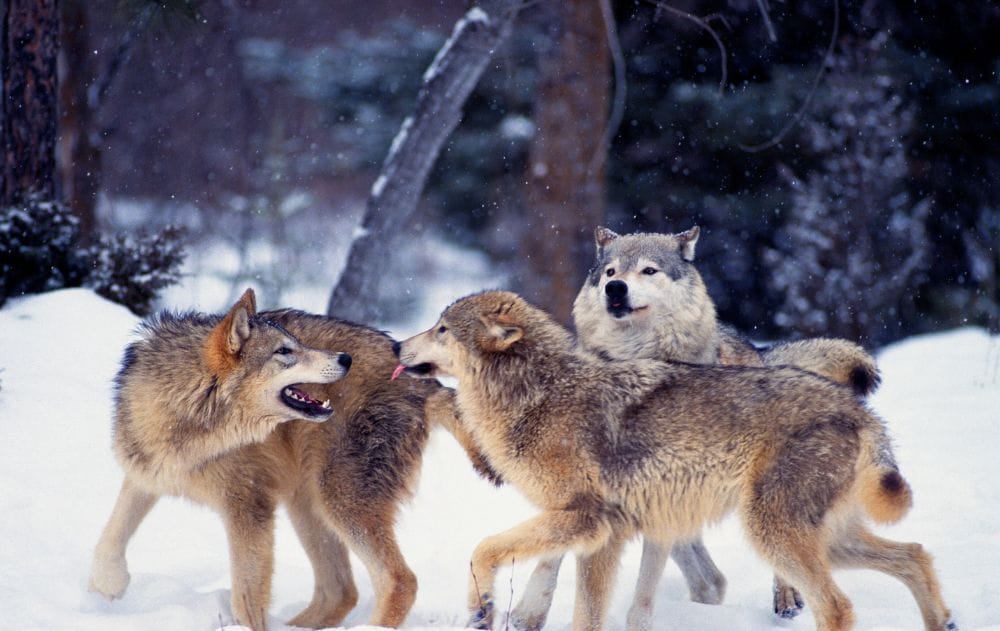
In the on-going saga over wolf management in the western United States, a federal judge in Missoula issued a significant ruling on Tuesday that could very well reshape the future of gray wolf conservation. U.S. District Judge Donald Molloy determined that the U.S. Fish and Wildlife Service violated the Endangered Species Act by denying a 2021 petition to relist gray wolves in the Northern Rocky Mountains, which includes Idaho, Montana, Wyoming, and portions of Oregon, Washington, and Utah. The decision mandates that the USFWS reevaluate the petition, using the best available science and considering the species’ historical range, including areas like the southern Rocky Mountains and Colorado.
It’s been well over a decade since gray wolves in the Northern Rockies were removed from ESA protections, with their management authority rightly transferred to the states in which they reside. Since then, states like Montana and Idaho have implemented policies allowing significant wolf harvests, helping better balance the population levels of the wild canines. Despite the success of state management, conservation groups, including the Center for Biological Diversity and the Sierra Club, remain unhappy with the fact that wolves are being properly managed. As such, the organizations filed a lawsuit in 2024, arguing that these state policies threaten the long-term survival of wolf populations, claiming that hunting and trapping could potentially reduce their numbers by 80-90%.
Judge Molloy’s Tuesday ruling vacated the USFWS’s 2024 decision to deny federal protections, criticizing the agency for failing to adequately assess state management practices and their impact on wolf populations. The judge highlighted that the USFWS overlooked the potential for wolf recovery in regions like Colorado, where wolves are naturally returning and a reintroduction program is underway. Molloy emphasized that the agency must consider the species’ historical range and use robust scientific evidence in its reassessment.
While many would argue that (some) state agencies are running a pretty tight ship with regards to wolf management, the good news is that this ruling does not immediately restore federal protections for gray wolves. What it does mean is that the USFWS is now required to reconsider the 2021 petition, though no specific timeline was provided, and the agency may appeal the decision. And given that the original petition took about three years to come to fruition, we ought to expect this process to eat up a similar amount of time.
Conservation organizations view the ruling as a critical step toward broader wolf recovery across the western U.S. Andrea Zaccardi, a senior attorney at the Center for Biological Diversity, stated, “This decision gives wolves a fighting chance to reclaim their historical range and thrive in places like Colorado.”
Conversely, critics, including Senator Steve Daines of Montana, argue that the ruling undermines effective state management and the success of wolf recovery, with over 6,000 wolves currently in the Lower 48 states.
The decision also arrives amid broader political debates, including a proposed bill (H.R. 845) by Representative Lauren Boebert to delist wolves nationwide, which could further complicate the path to federal protections.

Incoming FWS chief and former director of Wyoming’s Game and Fish Department Brian Nesvik
As of right now, the USFWS has declined to comment on the ruling, citing ongoing litigation. As the agency prepares to reassess the petition, it will be done under incoming FWS chief Brian Nesvik, who was confirmed earlier this month.
Coming off a near 30-year career with Wyoming’s Game and Fish Department, Nesvik later served as the agency’s director. Throughout his career, Nesvik has consistently advocated for the removal of federal protections for both grizzly bears and wolves, which should serve as a sign of things to come.

